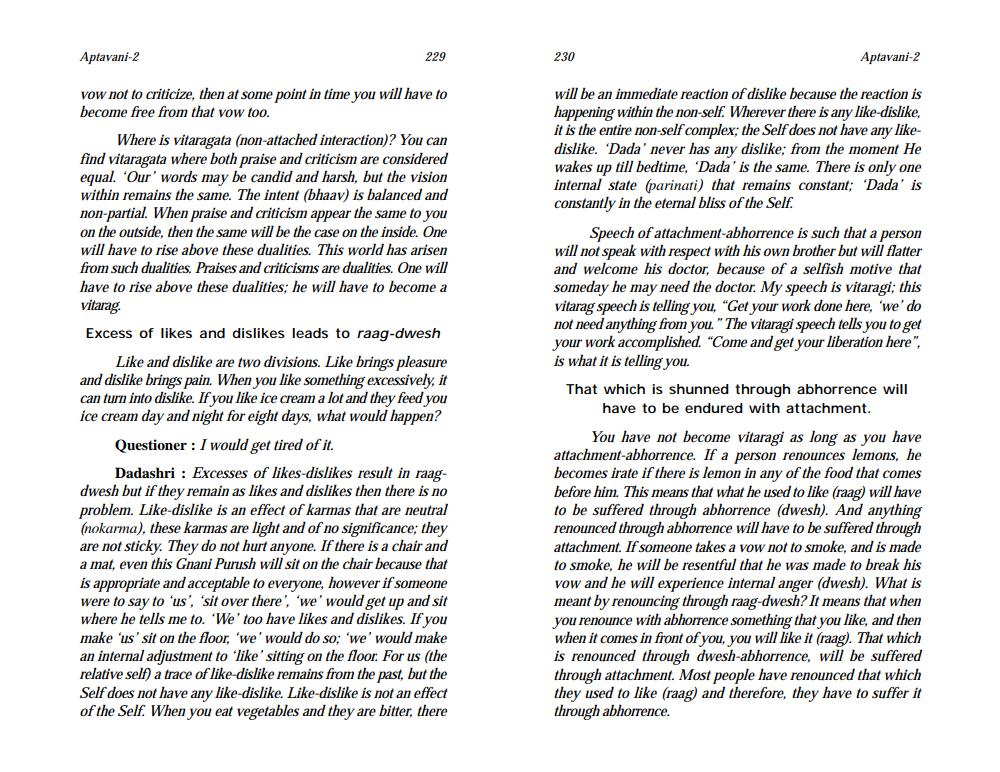________________
Aptavani-2
229
230
Aptavani-2
vow not to criticize, then at some point in time you will have to become free from that vow too.
will be an immediate reaction of dislike because the reaction is happening within the non-self. Wherever there is any like-dislike, it is the entire non-self complex; the Self does not have any likedislike. 'Dada' never has any dislike; from the moment He wakes up till bedtime, 'Dada' is the same. There is only one internal state (parinati) that remains constant; 'Dada' is constantly in the eternal bliss of the Self.
Speech of attachment-abhorrence is such that a person will not speak with respect with his own brother but will flatter and welcome his doctor, because of a selfish motive that someday he may need the doctor. My speech is vitaragi; this Vitarag speech is telling you, "Get your work done here, 'we' do not need anything from you." The vitaragi speech tells you to get your work accomplished. "Come and get your liberation here" is what it is telling you. That which is shunned through abhorrence will
have to be endured with attachment.
Where is vitaragata (non-attached interaction)? You can find vitaragata where both praise and criticism are considered equal. 'Our' words may be candid and harsh, but the vision within remains the same. The intent (bhaav) is balanced and non-partial. When praise and criticism appear the same to you on the outside, then the same will be the case on the inside. One will have to rise above these dualities. This world has arisen from such dualities. Praises and criticisms are dualities. One will have to rise above these dualities; he will have to become a vitarag Excess of likes and dislikes leads to raag-dwesh
Like and dislike are two divisions. Like brings pleasure and dislike brings pain. When you like something excessively, it can turn into dislike. If you like ice cream a lot and they feed you ice cream day and night for eight days, what would happen?
Questioner: I would get tired of it.
Dadashri : Excesses of likes-dislikes result in raagdwesh but if they remain as likes and dislikes then there is no problem. Like-dislike is an effect of karmas that are neutral (nokarma), these karmas are light and of no significance; they are not sticky. They do not hurt anyone. If there is a chair and a mat, even this Gnani Purush will sit on the chair because that is appropriate and acceptable to everyone, however if someone were to say to 'us', 'sit over there', 'we' would get up and sit where he tells me to. 'We' too have likes and dislikes. If you make 'us' sit on the floor, 'we' would do so; 'we' would make an internal adjustment to 'like' sitting on the floor. For us (the relative self) a trace of like-dislike remains from the past, but the Self does not have any like-dislike. Like-dislike is not an effect of the Self. When you eat vegetables and they are bitter, there
You have not become vitaragi as long as you have attachment-abhorrence. If a person renounces lemons, he becomes irate if there is lemon in any of the food that comes before him. This means that what he used to like (raag) will have to be suffered through abhorrence (dwesh). And anything renounced through abhorrence will have to be suffered through attachment. If someone takes a vow not to smoke, and is made to smoke, he will be resentful that he was made to break his vow and he will experience internal anger (dwesh). What is meant by renouncing through raag-dwesh? It means that when you renounce with abhorrence something that you like, and then when it comes in front of you, you will like it (raag). That which is renounced through dwesh-abhorrence, will be suffered through attachment. Most people have renounced that which they used to like (raag) and therefore, they have to suffer it through abhorrence.




